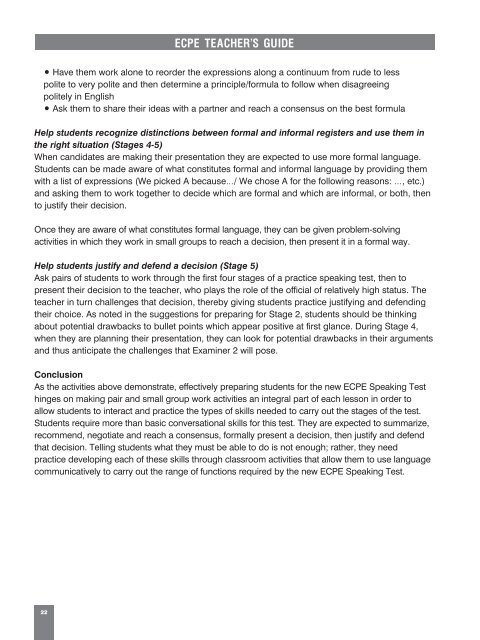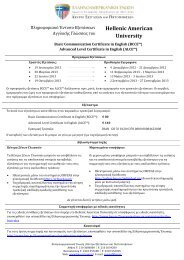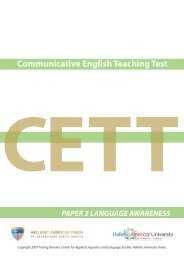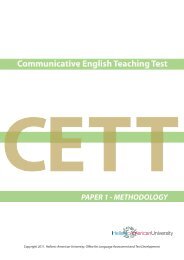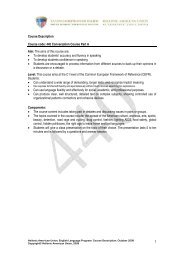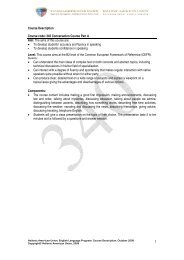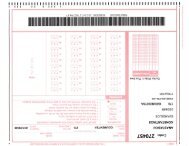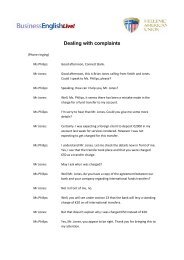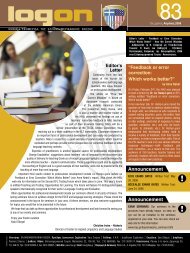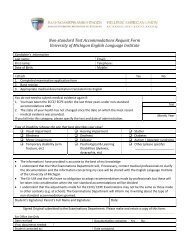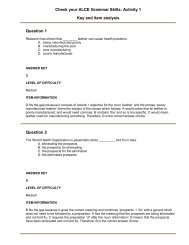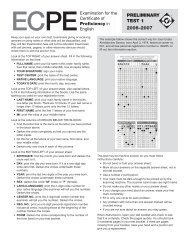ecpe teacher's guide - Hellenic American Union
ecpe teacher's guide - Hellenic American Union
ecpe teacher's guide - Hellenic American Union
Create successful ePaper yourself
Turn your PDF publications into a flip-book with our unique Google optimized e-Paper software.
<strong>ecpe</strong> teacher’s <strong>guide</strong><br />
• Have them work alone to reorder the expressions along a continuum from rude to less<br />
polite to very polite and then determine a principle/formula to follow when disagreeing<br />
politely in English<br />
• Ask them to share their ideas with a partner and reach a consensus on the best formula<br />
Help students recognize distinctions between formal and informal registers and use them in<br />
the right situation (Stages 4-5)<br />
When candidates are making their presentation they are expected to use more formal language.<br />
Students can be made aware of what constitutes formal and informal language by providing them<br />
with a list of expressions (We picked A because…/ We chose A for the following reasons: …, etc.)<br />
and asking them to work together to decide which are formal and which are informal, or both, then<br />
to justify their decision.<br />
Once they are aware of what constitutes formal language, they can be given problem-solving<br />
activities in which they work in small groups to reach a decision, then present it in a formal way.<br />
Help students justify and defend a decision (Stage 5)<br />
Ask pairs of students to work through the first four stages of a practice speaking test, then to<br />
present their decision to the teacher, who plays the role of the official of relatively high status. The<br />
teacher in turn challenges that decision, thereby giving students practice justifying and defending<br />
their choice. As noted in the suggestions for preparing for Stage 2, students should be thinking<br />
about potential drawbacks to bullet points which appear positive at first glance. During Stage 4,<br />
when they are planning their presentation, they can look for potential drawbacks in their arguments<br />
and thus anticipate the challenges that Examiner 2 will pose.<br />
Conclusion<br />
As the activities above demonstrate, effectively preparing students for the new ECPE Speaking Test<br />
hinges on making pair and small group work activities an integral part of each lesson in order to<br />
allow students to interact and practice the types of skills needed to carry out the stages of the test.<br />
Students require more than basic conversational skills for this test. They are expected to summarize,<br />
recommend, negotiate and reach a consensus, formally present a decision, then justify and defend<br />
that decision. Telling students what they must be able to do is not enough; rather, they need<br />
practice developing each of these skills through classroom activities that allow them to use language<br />
communicatively to carry out the range of functions required by the new ECPE Speaking Test.<br />
22


